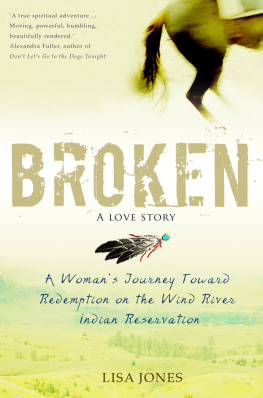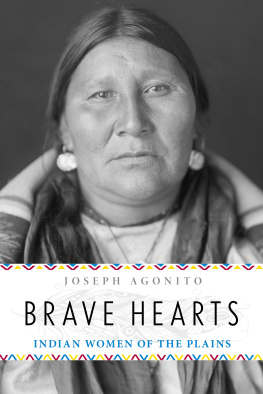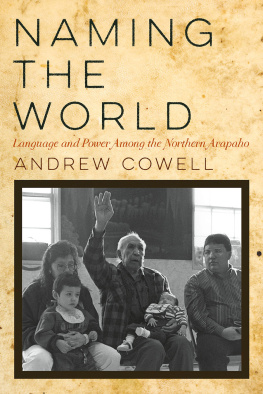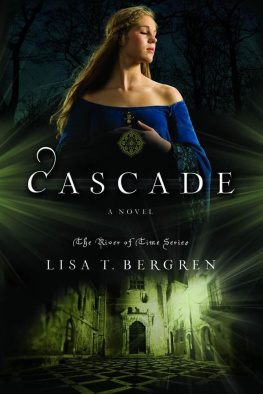
PRAISE FOR BROKEN
A stunning accomplishment! Lisa Jones captures the wild beauty of the Wind River Reservation, the pathos and joy of the Arapahos who live there, and the remarkable life of a modern-day medicine man. All of this while on a healing journey into the broken places of her own heart.
Margaret Coel, author of Blood Memory
A great endeavor; a beautiful and powerful tale. I would treat myself to Broken, relishing the language, and like a woman with the best dark chocolate red chile fudge, I would savor its pages.
Winona LaDuke, Anishinaabe activist and author of All Our Relations: Native Struggles for Land and Life and Recovering the Sacred: the Power of Naming and Claiming
A beautifully written, heart-wrenching journey into the depths of the soul. A tale of mystery, courage, and love between men, women, and horses.
Jim Fergus, author of One Thousand White Women and The Wild Girl
A true spiritual adventure. Moving, powerful, humbling, beautifully rendered. Arapaho elder Stanford Addison is the most wonderful of heroesand Jones is exactly the guide to bring him to us.
Alexandra Fuller, author of The Legend of Colton H. Bryant and Dont Lets Go to the Dogs Tonight
Intrepid only begins to describe Lisa Jones, who goes to admirable and adventuresome lengths to take the measure of a singular American spirit.
Ted Conover, author of The Routes of Man and Newjack
The author has a knack for describing events, people, and scenery so well that the reader can almost taste the weak, sugary coffee and feel the oppressive heat of the ceremonial sweat lodge.
Library Journal (starred review)
It is the rare non-Native writer who can gain access to the hearts of Native people to share their stories; rarer still is the non-Native writer who tells those stories with both a clear eye and a compassionate heart. Lisa Jones has not only succeeded on both counts, she has offered us a story of a man, a people, and the bond between human and animal that will touch the heart of any reader. What a fine book.
Kent Nerburn, author of Neither Wolf nor Dog and The Wolf at Twilight
Broken is about life loving us all equally and connecting us to spiritual responsibility. If you dont read Broken, you are missing out!
Tiokasin Ghosthorse, host of First Voices Indigenous Radio, WBAI, New York
I love this book a harrowing and ecstatic journey of mind, body and soulso beautifully told that the reader is not just transfixed but transformed.
Abigail Thomas, author of A Three Dog Life
Jones locates herself beautifully in a story that is hers and not hers. This is her first book. We look forward to the next.
Los Angeles Times
Broken makes me proud to be who I am, a Northern Arapaho from the Wind River Reservation.
Sterling Charles Blindman, Northern Arapaho, tenth grade, Wyoming Indian High School
This book is true. To respect privacy I have changed a few peoples names and omitted or modified certain details of Arapaho spiritual life. I also presented the story of Stanfords life earlier in the book than he actually told it to me, so the reader would have the benefit of knowing it as soon as possible.
Copyright 2009 by Lisa Jones
The moral rights of the author have been asserted.
All rights reserved. No part of this book may be reproduced by any mechanical, photographic or electronic process, or in the form of a phonographic recording; nor may it be stored in a retrieval system, transmitted or otherwise be copied for public or private use, other than for fair use as brief quotations embodied in articles and reviews, without prior written permission of the publisher.
The passage quoted from Mike Grudowskis 100-Proof Americana, Outside magazine, August 2005, appears courtesy of Outside magazine. Copyright 2005, Mariah Media Inc.
DESIGNED BY KYOKO WATANABE
ISBN 978-1-8485-0332-8 in print
ISBN 978-1-84850-536-0 in epub format
ISBN 978-1-84850-535-3 in Mobipocket format
To Stella Addison
(19302008)
who brought so much life into this world
And to my husband
with all my heart
Table of Contents
The day I met Stanford Addison, I sat with him outside his corral watching the horse inside it try to escape. First she got down on her belly like a cat and tried to crawl under the pole fence. Then she snaked her head between the upper poles and pressed her chest against them in an unsuccessful attempt to push the whole thing over. Then she ran around and around, squealing her disapproval of her new surroundings. Until the day before, she had spent her entire three years of life on the open range.
After a few laps, she stopped in front of Stanford. He sat in the wheelchair he had occupied for twenty-three years, letting the mares skidding hooves throw up a small hurricane of dust onto his long black braid, his half-toned, half-atrophied arms, and his slack legs. He squinted up through the fence. The mare tossed her head and whinnied, rolling her eyes piteously. I didnt know much about horses, but it struck me as strange that she would make a point of stopping right there in front of Stanford. She tossed and whinnied in what started to look to me like an appeal. Stanford watched until she was finished. Then he said in a low voice, I cant save you.
This was a common occurrence at the corralhorses explaining things to Stanford. In the months and years that followed, he never discussed this phenomenon with me. He would finish up at the corral, roll his electric wheelchair into the house, and turn on the Food Network, now and then interrupting the program to ask me questions about pesto and sushi. Or wed sit at his battered kitchen table, sipping on mugs of Folgers, and this paralyzed, six-toothed, one-lunged Plains Indian would take a drag of his KOOL Filter King, sigh, and say something like I guess the thing I miss most since the accident is ski jumping.
A joke. Stanford made me laugh a lot, which was a nice break from the confusion that often enveloped me during the five years I was a frequent visitor there. I wasnt trying to write an authoritative book about Native Americans or Native life. I was there to write a book about Stanfords evolution from what he had been, a bad-boy outlaw, into the renowned spiritual healer he had become. But I didnt get the information I needed in the quick question-and-answer sessions that had been the staple of my work as a journalist. I learned to wait and watch. And a lot of what I ended up watching was what was going on inside of me. Only when I was nearly finished with this book did I realize what it was aboutthe journey I took following Stanfords gentleness back toward its source, a journey so joyful, painful, and different from anything Id experienced that there was no way to prepare for it.
Which brings me back to the mare, breathing hard and kicking up dirt and trying to make sense of where she had found herself. That was exactly what I did for much of the time I spent at Stanfords. I, too, skidded to a halt and silently pleaded with him to save me, or at least to explain what was happening. But he couldnt. Or wouldnt.
The thing is, not only horses get broken around here. Everything does, starting with the ground itself. Millions of years ago, a new mountain range broke through the Ancestral Rocky Mountains, leaving the original ranges broken remains leaning against the flanks of the Wind River Range and the other mountain chains that comprise the modern-day Rockies. In 1878, at the end of the Indian wars, the Northern Arapaho people arrived at the upthrust of the Wind River Range in their own state of brokenness, defeated and hungry.
Next page










